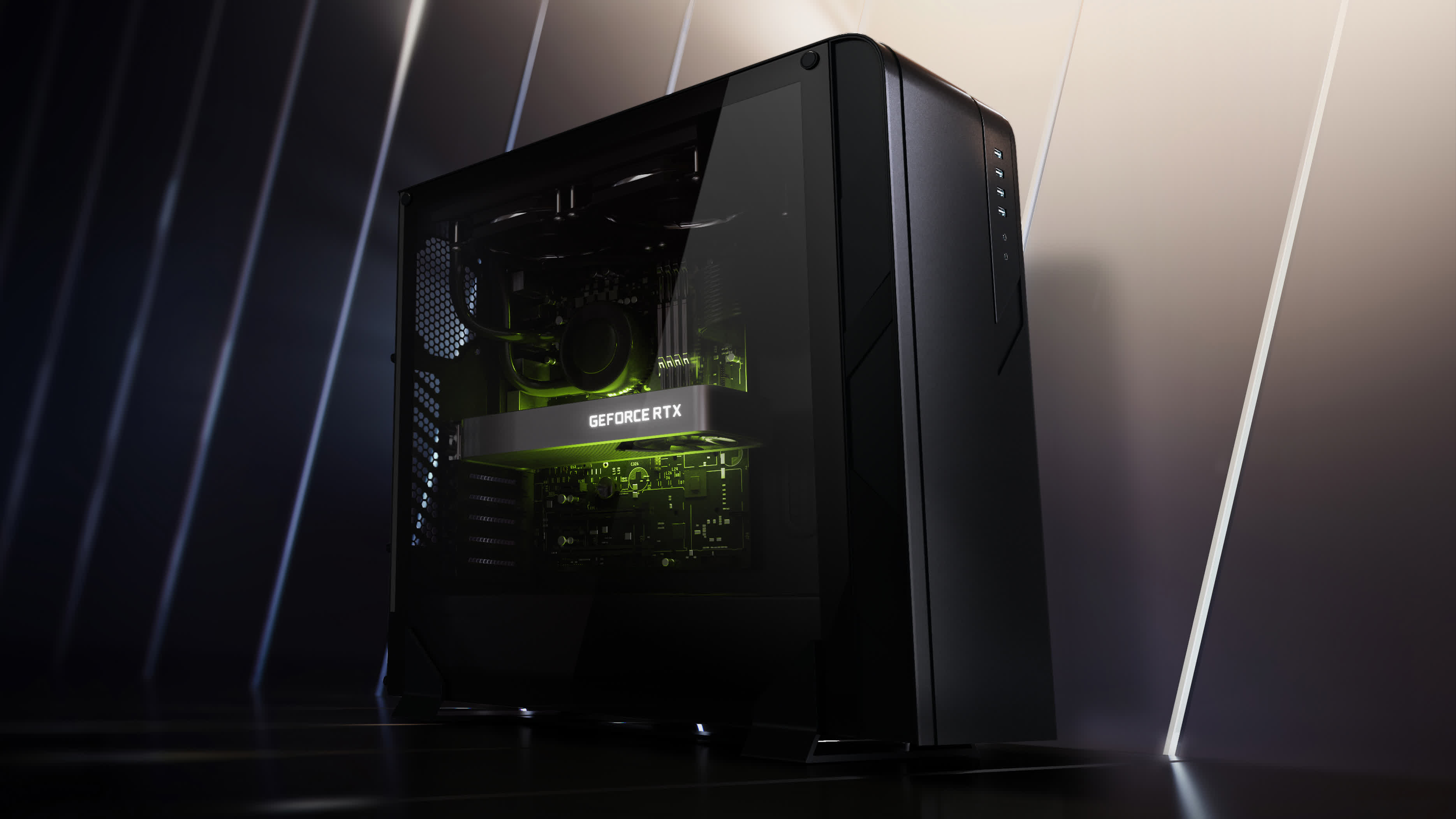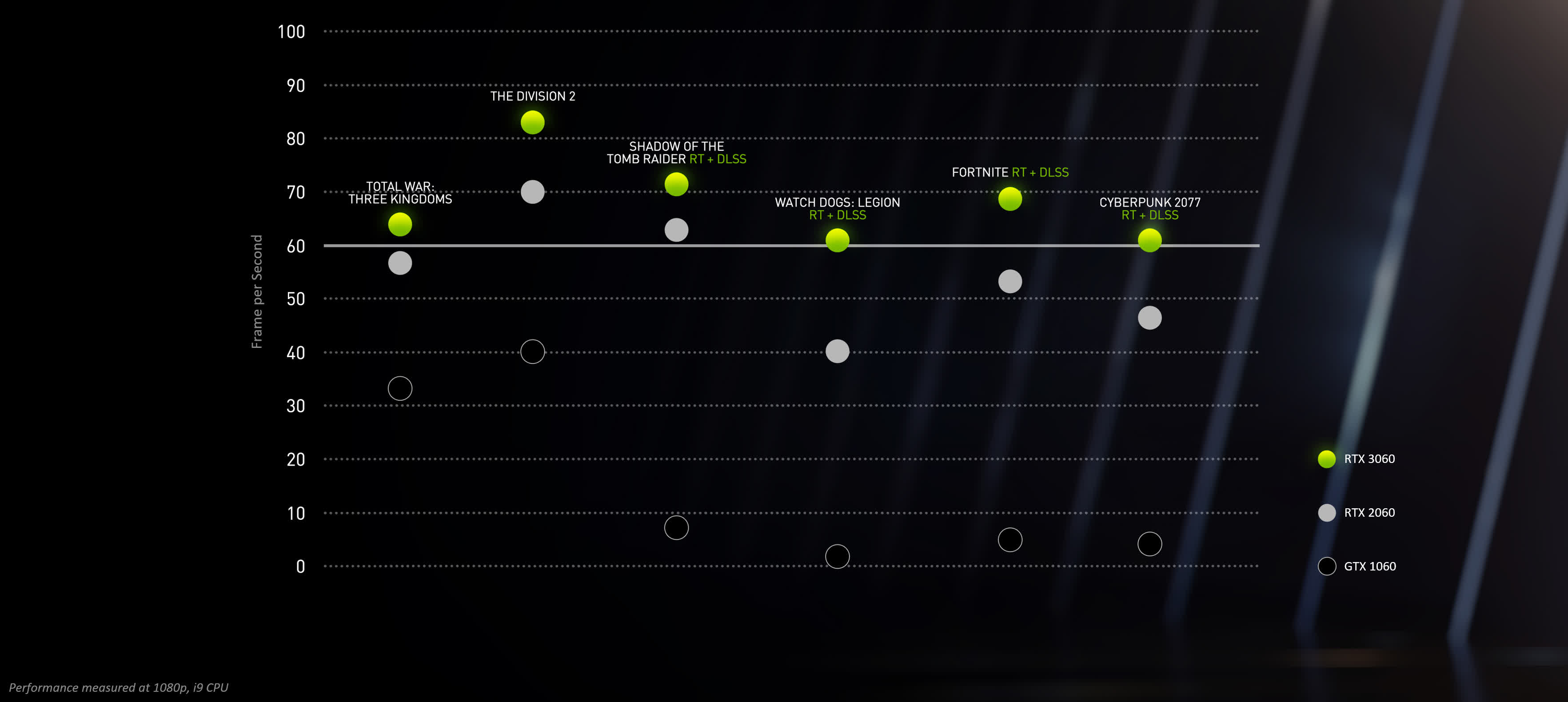Nvidia's GeForce RTX 3060 boasts 12GB of VRAM and 3,584 CUDA cores for $329
Highly anticipated: The highlight of any Nvidia CES keynote is e'er the new hardware it shows off, and this twelvemonth'southward event certainly didn't disappoint there. There was no big RTX 4000-serial reveal (nor should there have been), but we did encounter the kickoff true budget 3000-series card: the RTX 3060, coming in at just $329.
The carte du jour is expected to launch erstwhile in Feb -- at least, for the machine-purchase bots and scalpers that accept been ravaging the hardware market place over the past several months. Everyone else might have to wait longer for stock to come in.
At any charge per unit, the 3060's biggest selling point (aside from its sub-$350 cost tag) is its 12GB of GDDR6 VRAM. That figure surpasses last gen's RTX 2080 Ti, and even this gen's RTX 3080, which have 11 and 8GB of VRAM, respectively.
The 3060 was built with a 192-bit retention motorbus, and information technology's set up to feature 3,584 CUDA cores and a base of operations clock speed of 1.32 GHz (boost clocks get up to 1.78 GHz). It's expected to draw effectually 170 West of power on average over a PCIe 8-pin connector, which should fit into about modern builds quite nicely.

Nvidia promises up to twice the raster functioning of the GTX 1060, and 10x the RT performance. That'south a rather useless and frankly puzzling comparison, given that the 1060 is 2 generations erstwhile and doesn't fifty-fifty back up RTX in the first identify.
Edit: To clarify, Pascal cards do technically support RT functions following a commuter update from Nvidia some fourth dimension ago, merely their operation is and then terrible that Nvidia's comparisons are still rather meaningless.
A much meliorate comparison would be to stack up the 3060 against the 2060: both cards proclaim to support RTX technology, and they're only a generation apart. Fortunately, Nvidia tossed the states a bone in that location, also, with the post-obit chart:

According to Nvidia's calculations, the RTX 3060 is tin can push somewhere in the neighborhood of 60-64 FPS in Sentinel Dogs: Legion at 1080p with RT and DLSS enabled (it'due south unclear what RT and DLSS settings were used, notwithstanding). The 2060, however, sinks to the low 40s, which is no surprise given the generational differences here. The 1060's performance is listed also, but again, it'due south an irrelevant comparing.
As usual, nosotros'd propose you to take manufacturer benchmarks with a grain of salt. Information technology'south not that Nvidia is intentionally misleading anyone here, but rather that we only don't know what methodology they use to get in at their conclusions, and thus cannot verify them. It'south always better to wait for contained benchmarks, such equally our ain.
Yet, if you wish to throw circumspection to the wind, you lot tin can snag a 3060 of your ain next month. We'll update you when nosotros have a more concrete release engagement to share.
Source: https://www.techspot.com/news/88265-nvidia-geforce-rtx-3060-boasts-12gb-vram-3584.html
Posted by: howejuserebeaven.blogspot.com


0 Response to "Nvidia's GeForce RTX 3060 boasts 12GB of VRAM and 3,584 CUDA cores for $329"
Post a Comment